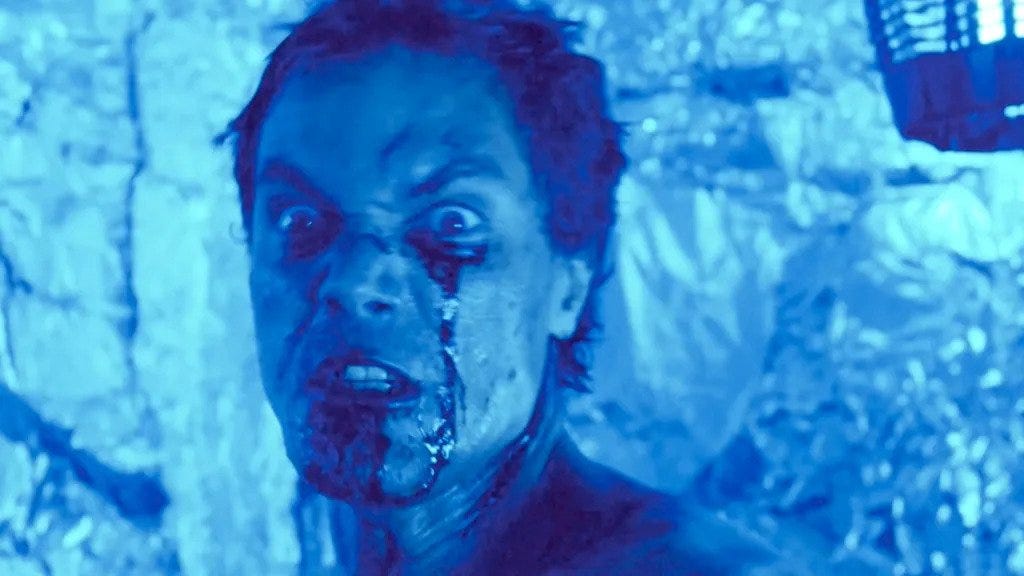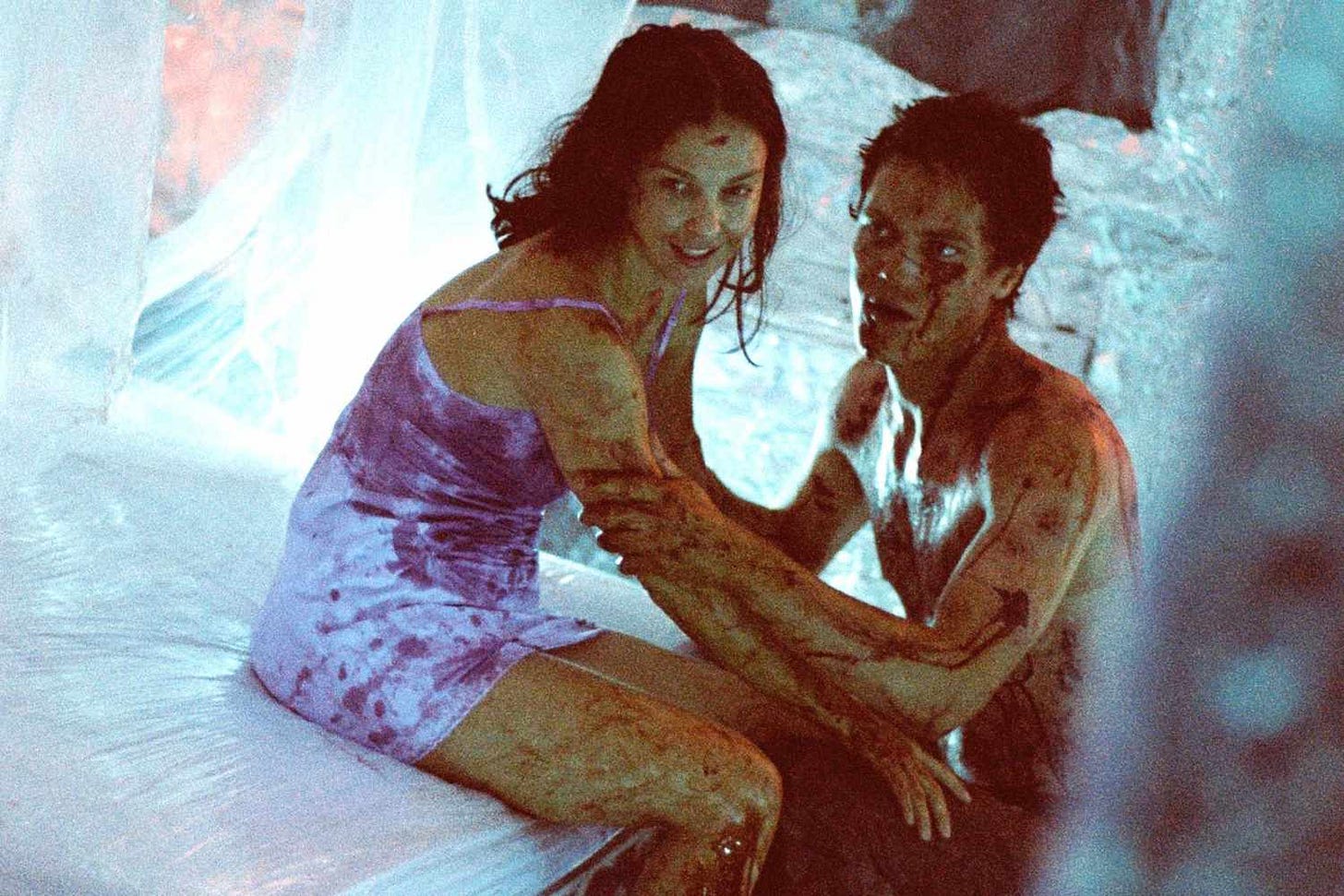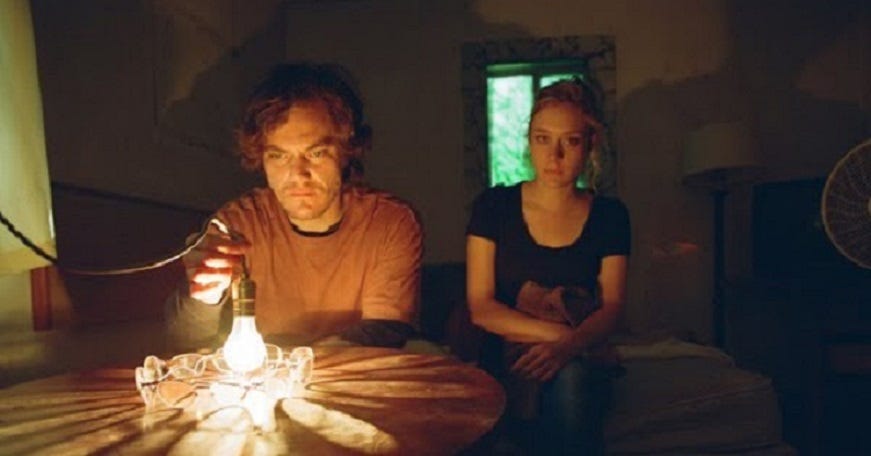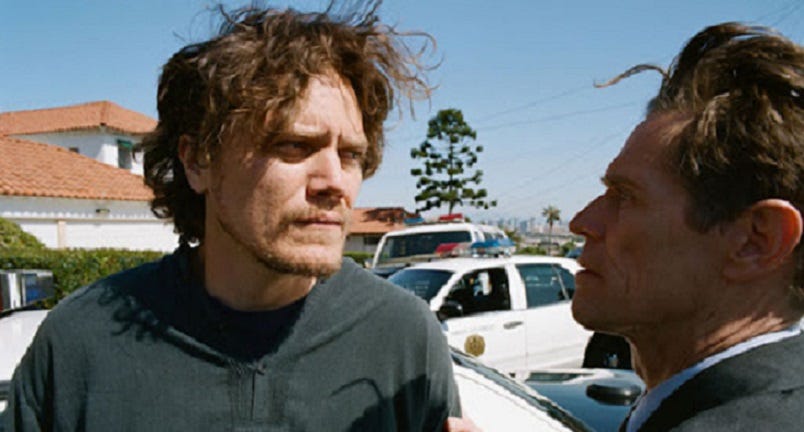Bug (2006) - director William Friedkin, writer Tracy Letts
My Son My Son What Have Ye Done? (2009) - director/co-writer Werner Herzog, co-writer Herbert Golder
WHEREAS Few are as dedicated to and proficient at their craft as Michael, now therefore
BE IT RESOLVED That we, the Mayor and the members of the City Council of Chicago… do hereby declare August 7 as National Michael Shannon Day
Council Resolution r2023-0002812, City of Chicago
The normal practice here on Back to Back is to compare films with similar themes, or similar genres, with a parallelism of style or story. But for once we’ll break with that tendency and compare two films with the most watchable of contemporary actors, the man who burns the screen with the intensity of his presence. He makes the dreariest of films watchable, the turkiest of turkeys just that much less a failure.
In the two films considered today he’s not rescuing utter flops from obscurity, as these are solid works by highly revered directors, well received in some quarters at time of release but since become more obscure than they deserve to be.
But they’re hardly star vehicles either - there’s something ‘wrong’ with both of them from the perspective of commercially acceptable cinema. One is an extraordinarily weird intense psychological drama, verging on horror, that the director gives full rein to in terms of mind-bending paranoia, and which Shannon and his co-lead Ashley Judd fully commit to.
The other is a police thriller that doesn’t thrill, a hostage drama without the drama, a tense standoff with all the tension deliberately sucked out. Shannon as always gives it his all as a deeply disturbed young man. A collaboration between Werner Herzog and David Lynch, with Michael Shannon, Chloë Sevigny and Willem Dafoe starring, you’d imagine it would be a cult classic, on the very highest pedestal of midnight moviedom. Instead it lies forgotten and ignored.
I guess I'd rather talk with you about bugs than nothing with nobody.
Bug is a spectacular voyage through psychosis, with terrifying and intense performances by leads Michael Shannon and Ashley Judd, and is as weird and disturbing as anything by David Cronenberg. It is unrestrained and very possibly in bad taste as it pokes at trauma and mental illness for our entertainment, but is never boring.
William Friedkin was famously the director of The French Connection (1971), The Exorcist (1973), and Sorcerer (1977) whose box-office failure is widely credited with ending the big-movie era of his career: it opened opposite Star Wars (1977) and crashed spectacularly. Friedkin, who had been courted by big studios and major stars, was seen as financially radioactive and thereafter was only able to make films on a modest budget. So his is a career with clear major and minor phases.
Bug, his third from last, is very definitely in the minor category, with a budget of just $4m and a single setting, the seedy motel room inhabited by the principal characters. We are in definite indie territory here, and everything about the film screams "debut feature", though in fact it is made by a 70 year-old Hollywood veteran and not a 26-year-old film school graduate.
It looks and feels like a stage play and in fact is Friedkin's adapation of a theatre piece by Tracy Letts. Unlike other adaptations of stage plays, Friedkin chooses not to take the action outside except in very brief scenes, preferring to stick to the claustrophobic sickly atmosphere of the room. The room itself, setting for the paranoid psychodrama that is to come, becomes almost a character, its changes reflecting the inner breakdown of the leads.
Peter (Shannon) is an army deserter who comes to live with waitress Agnes (Judd) in her remote desert motel cabin. He says he escaped from a facility where obscene medical experiments were performed on patients, implanting them with insect egg-sacs. He himself is infected with swarms of bugs, he tells her.
Agnes, whose past has its own brand of trauma, takes pity on this twitchy desperate man who is, in his lucid moments, considerate and kind to her. She is desperately lonely and in fear of her violent ex-husband Jerry (Harry Connick Jr), and so the two become lovers.
As the relationship develops, so does Peter's psychosis, and Agnes begins to share it. Shannon, as Peter, is absolutely mesmerising as a man in the grip of delusional fantasies of the most disgusting variety. He picks and tears at his own skin, worries constantly about infestation, and sees bugs scuttling around the room.
The final act goes down the rabbit hole of Peter and Agnes's shared madness. It's very much like the most hallucinatory parts of Requiem for a Dream (2000), but extended for longer than may be safe for the viewer's own mental stability. From The Exorcist, we know that Friedkin can do fantastical horror, and he pulls out all the stops here in showing Peter's vision world of insect overlords and parasitical controllers.
Some might accuse it of being "mental illness porn", exploitative in the way it pushes the madness for our entertainment. Perhaps that's true to an extent, and Friedkin’s direction is not always rigorously sensistive, but the empathy of the viewer is very much engaged with these people.
In any case the Gothic tradition has a long history of engaging with "madness" as a fertile way to explore the boundaries of self and the regions of fantasy. In this way one viewer’s “mental illness porn” is another viewer’s fantastic exploration of a realm of desire and imagination.
Bug is a tour-de-force of astonishing vigour, and is never dull even for a moment. The lead performances, particularly by Michael Shannon, are engaging and deeply sympathetic.
— INTERMISSION —
Made and released in the same year as Herzog's other Hollywood incursion, Bad Lieutenant: Port of Call New Orleans, and showing the same disdain for the crime genre it was nominally part of, this film also went head-to-head with its counterpart in Cannes, the only known case of a director competing with himself for the Golden Palm. It was produced by David Lynch, and Lynch’s unseen presence and patronage shows in touches and tributes all the way through.
Herzog is happy to enter a Lynchian world in this standoff drama which has none of the habitual elements of the standoff. The police negotiator (Willem Dafoe) is much more interested in coffee than in hostage negotiations, of which there are the bare minimum. There are no scenes showing the hostages fearing for their lives, rather a series of flashbacks in which the dangerously unbalanced Brad McCallum (Michael Shannon) becomes involved in a disastrous whitewater rafting expedition to Peru and then an amateur dramatic group's rendition of the Oresteia, a classical tragedy sequence in which the main character kills his mother.
He visits his uncle's ostrich farm to get an imposing cavalry sabre to be used as 'prop' in the threatre production. Even though it's the wrong type for a play set in classical Greece, he insists on keeping it. Meanwhile the uncle, played by Brad Dourif (who reappears in Bad Lieutenant, the actor clearly of a Herzog favourite type) relishes the chance to rail against actors as homosexuals and all theatre productions as dumb and gay. A speech about ostriches in the Bible follows. Soon there's a sequence in which the uncle tells a story about a dwarf on a little horse, a Herzog staple, but here in a Lynchian forest setting.
In this moment, as elsewhere, the action freezes and the actors hold their position, staring into the camera in a form of defiant tableau. Not a freeze frame but a still moment in the drama, a device used to great effect in other films, for example in Ben Wheatley's A Field in England (2010) to distance the viewer from the immediacy of the plot and reflect on where it and where it's going. One of many Brechtian moments in this film which only has a passing interest in being what it purports to be, a crime-mystery/hostage drama. Instead it seems bent, like its counterpart Bad Lieutentant, on satirising the excesses and stupidities of the American culture.
Much of the flashback is narrated by the pairing of Chloë Sevigny as Brad's girlfriend, who takes a cue from Naomi Watts' Betty in Mulholland Drive (2001) by wearing clothes too small for her, to make her even more childlike and naïve than her oblivious actions make her already appear, and Udo Kier as Lee, the director of the theatre production in which Brad is cast as mother-murdering Orestes. Flashbacks to the rehearsals give an opportunity to discuss the brutal savagery of Greek myth, steeped in murder, sex and incest. But they also show Brad as a terrific prima donna and ham, giving the lie to Lee's assertion that he was a talented actor.
Finally, there's Grace Zabrinskie as Brad's mother, shown as the murder victim right at the beginning - so there's no possible element of doubt or intrigue about the crime. She doesn't have much to go on, appearing only in a few scenes, but she gives a tremendous performance as a mother whose anxiety about her clearly unhinged son leads her to more and greater follies of control and indulgence. The scene where she stands berating Brad for his indolence as he sits at a huge drumkit she's bought for him is a scathing vignette of American parents and their spoiled overindulged brats.
The parallels with the classical tragedy of Orestes, in all its terror and grandeur, is undercut at every moment by the banalization of contemporary American life - the cops concerned about coffee, the incompetent and pretentious bearers of culture, the neurotic parents, the many characters who seem simply oblivious to what they see around them, like sleepwalkers or people in a hypnotic trance - just like in Herzog’s Heart of Glass (1976). When Brad wants his girlfriend to live nearby, he simply walks into neighbouring houses and demands that the owners sell it to him, despite having no money. The dysfunction he represents is, suggests, Herzog, pervasive (though Brad, crazy as he seems, is more perceptive than the hippies he travels with on the tragic trip to the Peruvian jungle.
This is the meaning of the moments when the action pauses and the characters stare into the eyes of the viewer so defiantly - we are you, they are saying, our foolhardy sleepwalk toward calamity is your own. However, the commercial cinema audiences liked neither the casual subversion of their cop-genre movie nor the Lynchian moments of estrangement and challenge.
The film, despite the absolutely unmatchable cast of Dafoe, Shannon, Sevigny, Zabriskie, Kier, Dourif and Peña, flopped badly (as did Bad Lieutenant). But it really is a wonderful and watchable gem, if nothing else, for the driven and always fresh performance of Michael Shannon.











